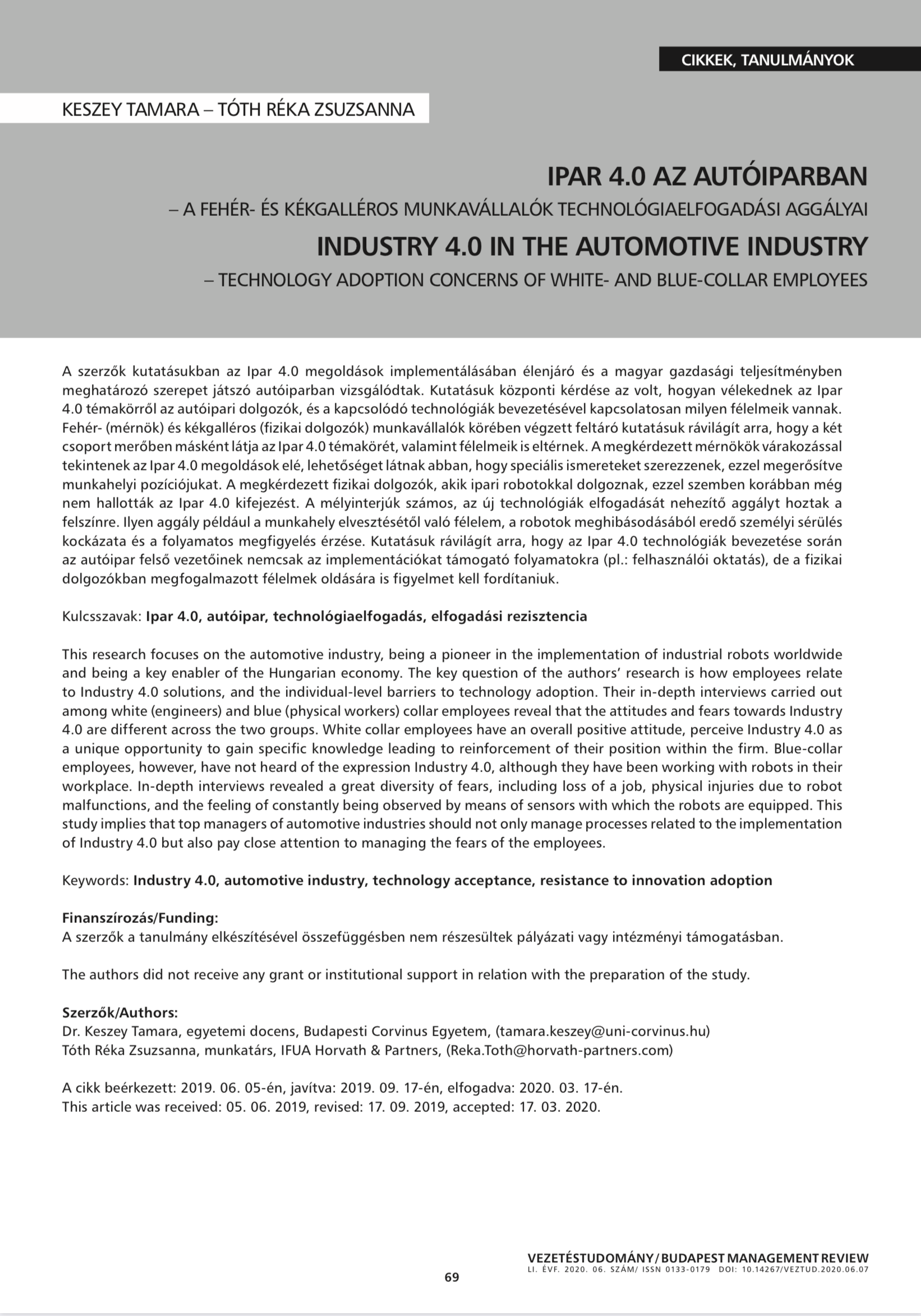Ipar 4.0 az autóiparban
A fehér- és kékgalléros munkavállalók technológiaelfogadási aggályai
DOI:
https://doi.org/10.14267/VEZTUD.2020.06.07Keywords:
Industry 4.0, automotive industry, technology acceptance, resistance to innovation adoptionAbstract
This research focuses on the automotive industry, being a pioneer in the implementation of industrial robots worldwide and being a key enabler of the Hungarian economy. The key question of the authors’ research is how employees relate to Industry 4.0 solutions, and the individual-level barriers to technology adoption. Their in-depth interviews carried out among white (engineers) and blue (physical workers) collar employees reveal that the attitudes and fears towards Industry 4.0 are different across the two groups. White collar employees have an overall positive attitude, perceive Industry 4.0 as a unique opportunity to gain specific knowledge leading to reinforcement of their position within the firm. Blue-collar employees, however, have not heard of the expression Industry 4.0, although they have been working with robots in their workplace. In-depth interviews revealed a great diversity of fears, including loss of a job, physical injuries due to robot malfunctions, and the feeling of constantly being observed by means of sensors with which the robots are equipped. This study implies that top managers of automotive industries should not only manage processes related to the implementation of Industry 4.0 but also pay close attention to managing the fears of the employees.
Downloads
References
Atkin, D., Chaudhry, A., Chaudry, S., Khandelwal, A. K., & Verhoogen, E. (2017). Organizational barriers to technology adoption: Evidence from soccer-ball producers in Pakistan. The Quarterly Journal of Economics, 132(3), 1101-1164. https://doi.org/10.1093/qje/qjx010
Bell, E., Bryman, A., & Harley, B. (2018). Business research methods. Oxford: Oxford University Press.
Brettel, M., Friederichsen, N., Keller, M., & Rosenberg, M. (2014). How virtualization, decentralization and network building change the manufacturing landscape: An Industry 4.0 Perspective. International Journal of Mechanical, Industrial Science and Engineering, 8(1), 37-44. https://doi.org/10.5281/zenodo.1336426
Cooper, J., & James, A. (2009). Challenges for database management in the internet of things. IETE Technical Review, 26(5), 320-329. https://doi.org/10.4103/0256-4602.55275
Davis, F. D. (1986). A technology acceptance model for empirically testing new end-user information systems: Theory and results. Boston, MA: Massachusetts Institute of Technology.
Fitzgerald, M., Kruschwitz, N., Bonnet, D., & Welch, M. (2014). Embracing digital technology: A new strategic imperative. MIT Sloan Management Review, 55(2), 1-13.
Frey, C. B., & Osborne, M. A. (2013). The future of employment: How susceptible are jobs to computerisation? Retrieved from https://www.oxfordmartin.ox.ac.uk/downloads/academic/The_Future_of_Employment.pdf
Johnson, M. (2010). Barriers to innovation adoption: a study of e-markets. Industrial Management & Data Systems, 110(2), 157-174. http://dx.doi.org/10.1108/02635571011020287
Kamble, S. S., Gunasekaran, A., & Sharma, R. (2018). Analysis of the driving and dependence power of barriers to adopt industry 4.0 in Indian manufacturing industry. Computers in Industry, 101(10), 107-119. https://doi.org/10.1016/j.compind.2018.06.004
Keszey, T., & Zsukk, J. (2017). Az új technológiák fogyasztói elfogadása. A magyar és nemzetközi szakirodalom áttekintése és kritikai értékelése. Vezetéstudomány, 48(10), 38-47. https://doi.org/10.14267/VEZTUD.2017.10.05
Lasi, H., Fettke, P., Kemper, H.-G., Feld, T., & Hoffmann, M. (2014). Industry 4.0. Business & Information Systems Engineering, 6(4), 239-242. https://doi.org/10.1007/s12599-014-0334-4
Lee, C., & Coughlin, J. F. (2015). Older adults' adoption of technology: an integrated approach to identifying determinants and barriers. Journal of Product Innovation Management, 32(5), 747-759. https://doi.org/10.1111/jpim.12176
Losonci, D., Takács, O., & Demeter, K. (2019). Az Ipar 4.0 hatásainak nyomában – a magyarországi járműipar elemzése. Közgazdasági Szemle, 66(2), 185-218. http://dx.doi.org/10.18414/KSZ.2019.2.185
Luthra, S., & Mangla, S. K. (2018). Evaluating challenges to Industry 4.0 initiatives for supply chain sustainability in emerging economies. Process Safety and Environmental Protection, 117(7), 168-179. https://doi.org/10.1016/j.psep.2018.04.018
Mason, J. (2005). Kvalitatív kutatás. Budapest: Jószöveg Műhely.
Mosconi, F. (2015). The new European industrial policy: Global competitiveness and the manufacturing renaissance. London: Routledge.
Parlament, E. (2016). Industry 4.0 Policy Department Economic and Scientific Policy. Retrieved from https://www.europarl.europa.eu/RegData/etudes/STUD/2016/570007/IPOL_STU(2016)570007_EN.pdf
PriceWaterhouseCoopers. (2017). Will robots really steal our jobs? An international analysis of the potential long term impact of automation. Retrieved from https://www.pwc.co.uk/economic-services/ukeo/pwcukeosection-4-automation-march-2017-v2.pdf
Saunders, M. N. (2011). Research methods for business students. Harlow: Pearson Education.
Seidman, I. (2002). Az interjú, mint kvalitatív kutatási módszer. Budapest: Műszaki Könyvkiadó.
Talke, K., & Heidenreich, S. (2014). How to overcome prochange bias: incorporating passive and active innovation resistance in innovation decision models. Journal of Product Innovation Management, 31(5), 894-907. https://doi.org/10.1111/jpim.12130
Venkatesh, V., & Bala, H. (2008). Technology acceptance model 3 and a research agenda on interventions. Decision Sciences, 39(2), 273-315. https://doi.org/10.1111/j.1540-5915.2008.00192.x
Venkatesh, V., & Davis, F. D. (2000). A theoretical extension of the technology acceptance model: Four longitudinal field studies. Management Science, 46(2), 186-204. https://doi.org/10.1287/mnsc.46.2.186.11926
Venkatesh, V., Morris, M. G., Davis, G. B., & Davis, F. D. (2003). User acceptance of information technology: Toward a unified view. MIS Quarterly, 425-478.
Világgazdaság. (2018). Eláraszthatják a magyar ipart a robotok. Retrieved from https://www.vg.hu/vallalatok/elaraszthatjak-magyar-ipart-robotok-2-767161/
Zhou, K., Liu, T., & Zhou, L. (2015). Industry 4.0: Towards future industrial opportunities and challenges. Paper presented at the 2015 12th International Conference on Fuzzy Systems and Knowledge Discovery (FSKD).

Downloads
Published
How to Cite
Issue
Section
License
Authors assign copyright to Vezetéstudomány / Budapest Management Review. Authors are responsible for permission to reproduce copyright material from other sources.

